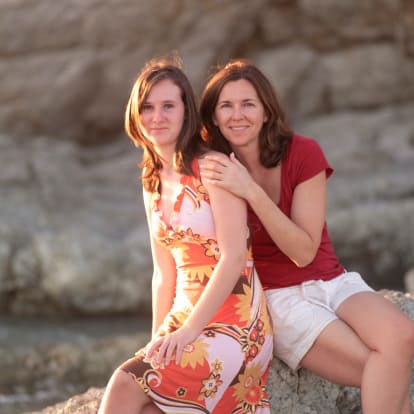HOW CAN WE PROTECT OUR DAUGHTERS WHILE MAKING THEM STRONG?
The worst sermon I ever gave was a reflection on a beautiful passage from Psalm 139: “I praise you, for I am fearfully and wonderfully made.” Those words spoke to me about one of the paradoxes of being human. We are somehow simultaneously fragile and sturdy, vulnerable and durable. To illustrate my point, I told a story from my rugby days that upset most of my congregation.
I didn’t grow up playing contact sports. The daughter of a strong feminist, I got the message of “Free to Be You and Me” loud and clear: Girls are no more fragile than boys and any princess worth marrying can outrun her suitors in a road race. But I wasn’t a particularly sporty kid. While my two brothers arm wrestled and climbed trees, I stuck with tap dancing and arts and crafts.
more fragile than boys and any princess worth marrying can outrun her suitors in a road race. But I wasn’t a particularly sporty kid. While my two brothers arm wrestled and climbed trees, I stuck with tap dancing and arts and crafts.
When I arrived at college as a freshman, I was ready to expand my horizons. I studied Japanese and ate sushi for the first time. I joined a drum circle. And I went out for women’s rugby. I learned about tackling at my second practice. As the coach instructed, I stood on the field with the ball in my hands and watched as one of my teammates ran toward me at full speed and knocked me down with her shoulder. I lay on the field for a few moments, staring at the sky, wondering, “Have I broken any bones? Will I still be able to walk?” To my surprise, I was perfectly okay. I didn’t break when I got knocked over. And I soon discovered that I didn’t break when I knocked someone else over either. Learning to tackle made me feel strong and confi dent, exactly what I needed as I faced all the various challenges of my new life as a college student. Rugby was also a heck of a lot of fun and our weekend matches were the high point of my week.
Then one Saturday, I broke another girl’s collarbone. I was playing ”prop,” one of three positions in the front row of a ”scrum,” a kind of standing human pyramid that pushes against an identical configuration of players from the other team when the ball needs to be put back into play. As occasionally happens, our scrum didn’t get into place quite right and we all collapsed to the ground in a twisted pile. I somehow managed to push and pull on my opponent’s shoulder in just the wrong way, and I could hear her collarbone break with a pop as we fell down together.
I was shocked at how easy it was to break someone’s bone. I had discovered just a couple of months earlier that we can survive a tackle unharmed and now I had to integrate another experience into my understanding of what it means to be human. We’re durable and we’re breakable. My experience with rugby illustrates for me the paradox that Psalm 135 so beautifully summarizes: We are, it turns out, both fearfully and wonderfully made. But when I described hearing the crack of the other girl’s collarbone as a metaphor in my sermon, I realized immediately I had gone too far. Everyone looked horrified. Some looked pale. And no one seemed to hear a word I said from that point on.
Their comments to me afterwards were all about how rugby is a dangerous sport and how crazy I was to have played it. While I’ll never use that story in a sermon again, I still think about the lessons I learned from rugby, especially in the context of raising my daughter. I want to be sure my daughter never confuses femininity with fragility. I want her to dive in and give things a try, not to hold back and hope someone will do it for her. Learning to be physically brave, it seems to me, is good training for being emotionally and socially and intellectually brave.
But I am also aware of my daughter’s vulnerability as she becomes a teenager. When my sons turned 14 and 15, I encouraged them to bike and walk to friends’ houses on their own. I let them go to the movies with friends without a parent chaperone. But I find myself hesitating when my daughter wants to do the same things. I don’t want to undermine her confidence, but I am also aware that teen girls are vulnerable to physical and emotional assault. They need to be wise about the kinds of risks they take and make plans to protect themselves.
How can we talk to our daughters about protecting themselves without scaring them? How can we encourage them to see themselves as both strong and vulnerable? I haven’t found a good way to make this point in a sermon say nothing of communicating it effectively to a teenager. The best I can do is to tell her both things: We are fearfully and wonderfully made, and the world we live in is fearful and wonderful. We live our lives in the midst of that paradox. *
Heather Kirk-Davidoff is the Enabling Minister of the Kittamaqundi Community Church in Columbia. She and her husband Dan are the parents of three biological children and an adult foster daughter.
Originally Published March/April 2013




